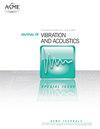Energy Transfer of an Axially Loaded Beam with a Parallel-Coupled Nonlinear Vibration Isolator
IF 1.9
4区 工程技术
Q2 ACOUSTICS
Journal of Vibration and Acoustics-Transactions of the Asme
Pub Date : 2022-04-12
DOI:10.1115/1.4054324
引用次数: 32
Abstract
Traditional vibration isolation of satellite instruments has an inherent limitation—that low-frequency vibration suppression leads to structural instability. This paper explores a parallel-coupled quasi-zero stiffness (QZS) vibration isolator for an axially loaded beam, with the goal of enhancing the effectiveness of low-frequency isolation. A QZS contains two magnetic rings, which contribute negative stiffness, and one spiral spring, with positive stiffness, a combination that has high static stiffness to resolve the structural instability. The frequency response functions (FRFs) of power flow are used to measure the effectiveness of vibration isolation. The magnetic stiffness of the magnetic rings is calculated using the principle of equivalent magnetic charge. The heights, radii, and gap of the magnetic rings affect its stiffness. The parallel-coupled QZS vibration isolator of an axially loaded beam is modeled using an energy method. Based on the Galerkin truncation, harmonic balance analysis, and arc-length continuation, an approach is proposed to analyze the FRFs of power flow for the parallel-coupled QZS vibration isolation of an axially loaded beam. Numerical results support the analytical results. Both analytical and numerical results show that the power reduction of axially loaded beams with a parallel-coupled quasi-zero vibration isolation system is more significantly suppressed at low frequencies.轴向加载梁并联非线性隔振器的能量传递
传统的卫星仪器隔振存在固有的局限性,即低频振动抑制会导致结构失稳。为了提高轴向加载梁的低频隔振效果,本文研究了一种平行耦合准零刚度隔振器。QZS包含两个磁环(负刚度)和一个螺旋弹簧(正刚度),该组合具有较高的静刚度以解决结构不稳定性。利用潮流频响函数(frf)来衡量隔振效果。利用等效磁荷原理计算了磁环的磁刚度。磁环的高度、半径和间隙影响磁环的刚度。采用能量法对轴向加载梁并联耦合QZS隔振器进行了建模。提出了一种基于伽辽金截断、谐波平衡分析和弧长延延的轴向加载梁并联耦合QZS隔振功率流频响分析方法。数值结果支持了分析结果。分析和数值结果表明,并联准零振动隔振系统对轴向载荷梁的功率衰减在低频处得到了较明显的抑制。
本文章由计算机程序翻译,如有差异,请以英文原文为准。
求助全文
约1分钟内获得全文
求助全文
来源期刊
CiteScore
4.20
自引率
11.80%
发文量
79
审稿时长
7 months
期刊介绍:
The Journal of Vibration and Acoustics is sponsored jointly by the Design Engineering and the Noise Control and Acoustics Divisions of ASME. The Journal is the premier international venue for publication of original research concerning mechanical vibration and sound. Our mission is to serve researchers and practitioners who seek cutting-edge theories and computational and experimental methods that advance these fields. Our published studies reveal how mechanical vibration and sound impact the design and performance of engineered devices and structures and how to control their negative influences.
Vibration of continuous and discrete dynamical systems; Linear and nonlinear vibrations; Random vibrations; Wave propagation; Modal analysis; Mechanical signature analysis; Structural dynamics and control; Vibration energy harvesting; Vibration suppression; Vibration isolation; Passive and active damping; Machinery dynamics; Rotor dynamics; Acoustic emission; Noise control; Machinery noise; Structural acoustics; Fluid-structure interaction; Aeroelasticity; Flow-induced vibration and noise.

 求助内容:
求助内容: 应助结果提醒方式:
应助结果提醒方式:


